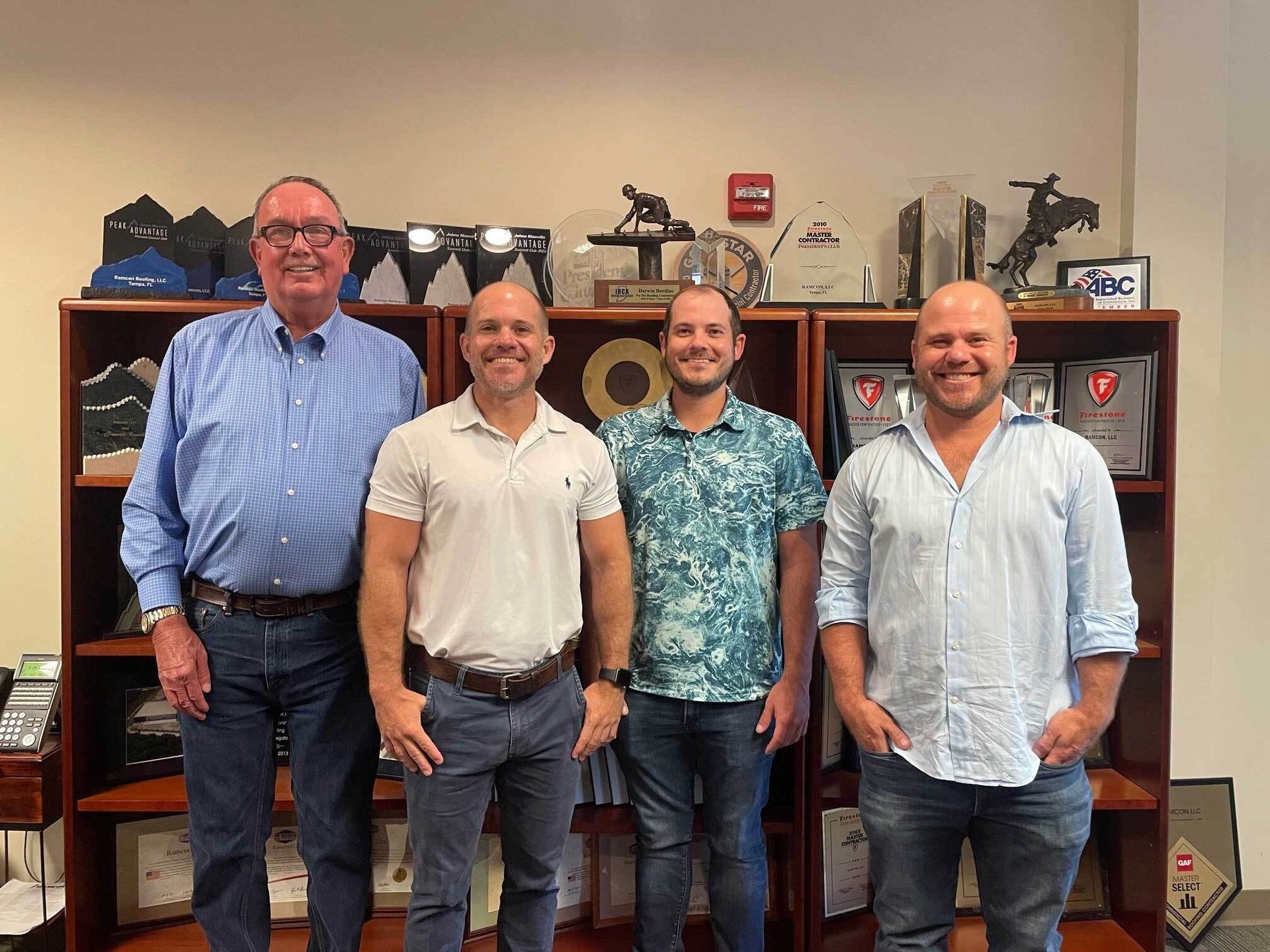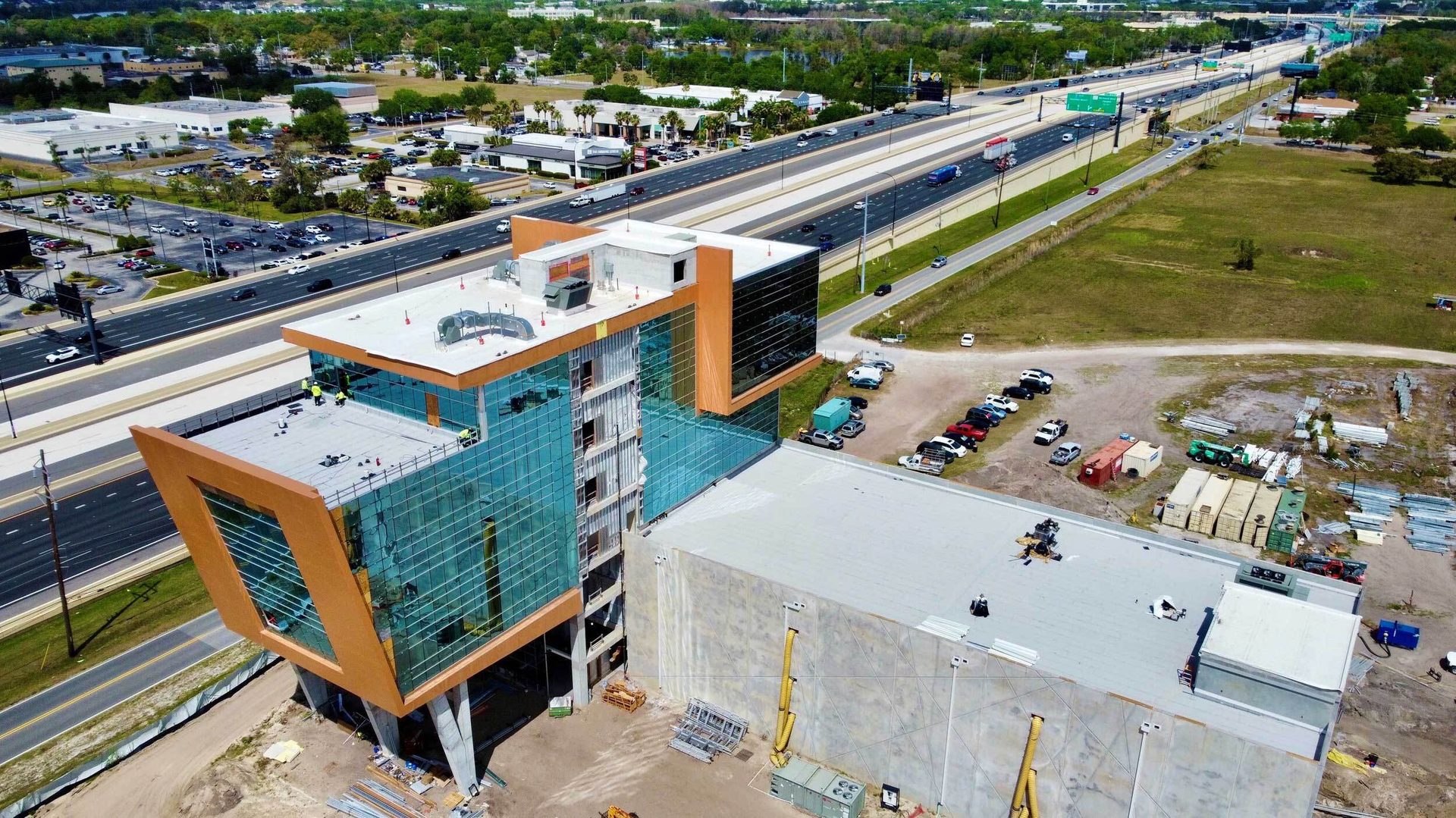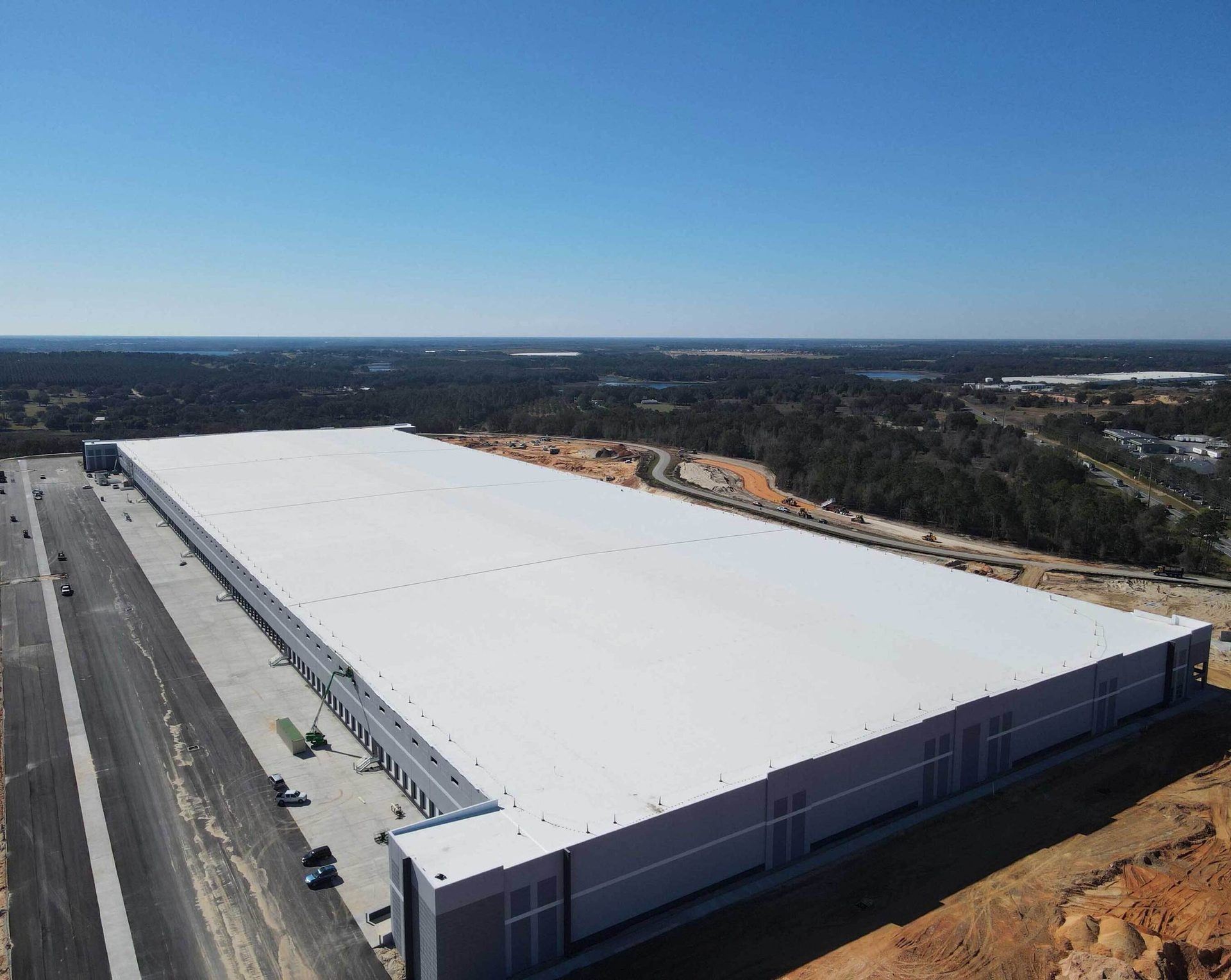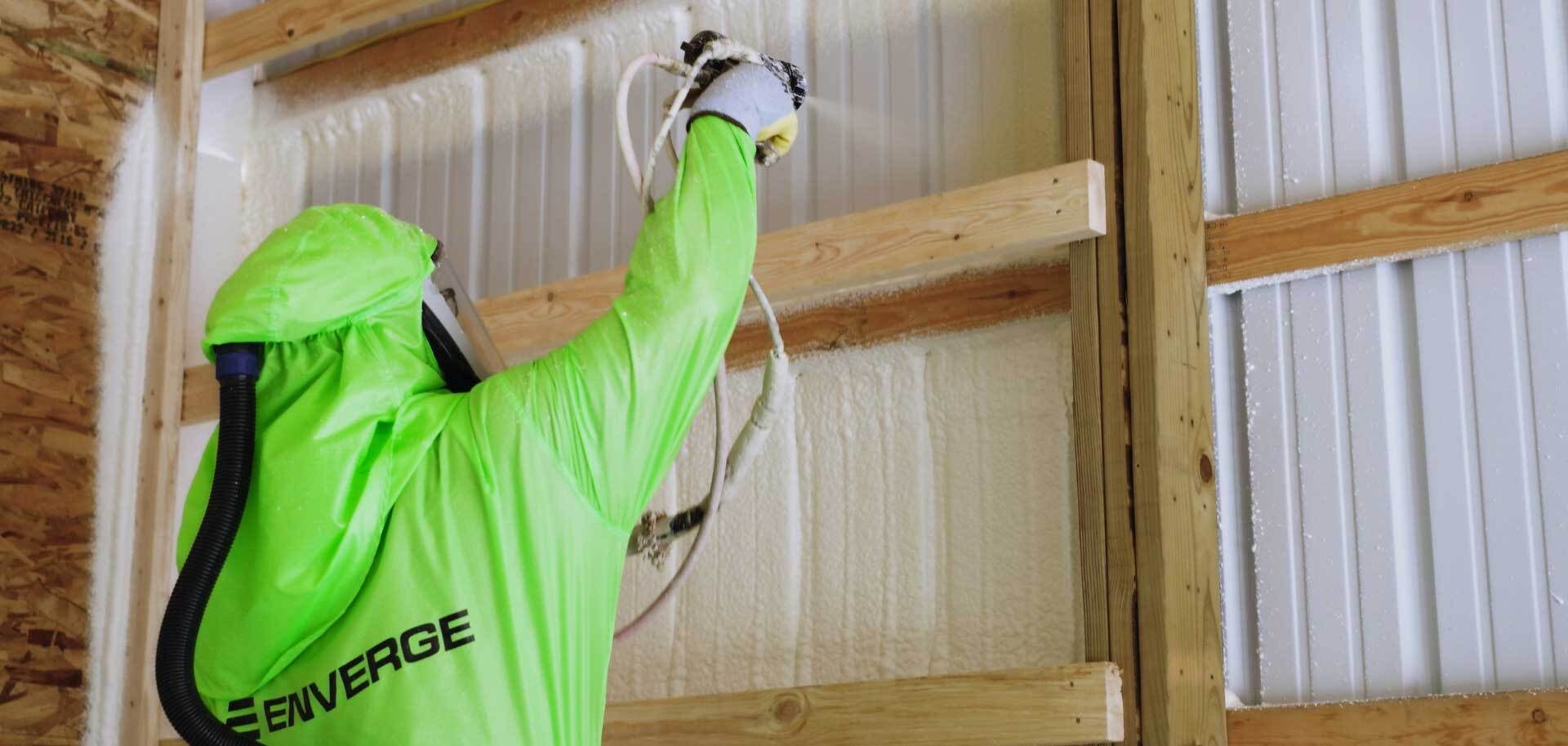
CONTRACTOR PROFILE
Third-generation roofers operating RAMCON Roofing of Tampa, Fla., place the most significant emphasis on safety, allowing quality and customer experience to shine.
By Bryan Gottlieb
The leadership team at RAMCON prioritizes quality without sacrificing safety. Pictured from left are Steve Kruse, Adam Burdine, Austin Burdine and Kyle Burdine. Image courtesy of RAMCON Roofing
SCROLL
DOWN

RAMCON Roofing LLC
Adam Burdine is the oldest of three brothers who, with their father’s former colleague and partner, Steve Cruse, are the principals of RAMCON Roofing in Tampa, Fla., a commercial and industrial roofing company built on core tenets he lists as “trust, communication and quality.”
Burdine’s surname may sound familiar to anyone acquainted with the history of America’s regional department store empires. In this case, Burdine’s was to South Florida as Filene’s was to Boston, or Marshall Field & Co. was to the Chicagoland area.
When coordinating an interview with him, naturally, one of my first questions was whether he was a member of that storied retail family. He replied, “Well if I was, Macy’s (Burdines’s successor) must have lost our check in the mail.”
It was my introduction to a gentleman who is simultaneously a straight shooter but always with a sense of humor.
Burdine, 40, along with brothers Kyle, 38 and Austin, 28, are third-generation roofing contractors whose roots trace back to Indianapolis, where their father — and his father before him — were roofing contractors. When Burdine was in grammar school, the family moved to South Florida, where their father was asked to open a second branch of Indiana-based Nu-Tech Roofing Contractors.
By the early aughts, during the heady days of the initial dotcom boom when commercial roofing was experiencing its initial roll-up, Burdine’s father Dale — the lead executive in the South Florida division of Nu-Tech — was caught in the consolidation fever. Burdine recalled his father saying he went from having “no bosses to being partners with bank ventures, and it was just terrible.”
Dale, his brother Sonny Burdine, and Cruse decided to hang their proverbial shingle, and in 2002, RAMCON opened for business. The company focused on large commercial and industrial spaces, mostly new low-slope builds, using single-ply, TPO, modified bitumen and other flat roof systems.
Today, the company's focus has not changed: commercial and industrial buildings, including big-box stores, schools, retail, hospitals, warehouses and the like. About 80% of the company’s work involves new construction, and the remaining 20% consists of reroofs, overlays, repairs and maintenance.
The Burdine brothers and Cruse — who, Adam says, is both a second father and mentor — assumed majority control of the company about five years ago. RAMCON then enjoyed annual revenues in the mid-$20 million realm and expects to close the 2024 calendar year with revenues somewhere north of $40 million. The company has 150-some-odd full-time employees, and a staggering amount of its clientele, which Burdine estimates it at around 93%, comes from repeat business.

RAMCON installed the roofing system for global data center company HostDime, which built its $100 million headquarters in Eatonville, Fla., about six miles north of Orlando. (IMAGE: RAMCON)
Divisions of Labor and a Focus on Quality
RAMCON is divided into three divisions: sales, operations, and maintenance. Adam heads up sales, his middle brother Kyle handles operations, and their youngest brother Austin leads maintenance. Given the yawning age gap between the two older brothers and Austin, Adam notes that their little brother, while still somewhat green, has intelligence beyond his years. He adds that Austin’s brilliance, which could have easily allowed him to pursue a career in medicine or another high-intensity field, brings a fierce determination to help further burnish this multigenerational effort.
Cruse, the remaining founding principal, remains on hand to provide institutional knowledge and, as mentioned previously, acts as both a mentor and proverbial oracle to this latest generation.
“Steve is a veteran of roofing,” Burdine says. “He calls himself the ‘Iowa farm boy’; he's a small-town Iowa guy who found his way to Florida and became a roofer. He has been a second father figure to us, certainly a mentor. He sets the example, and he's a leader here. He's one of the original ‘OGs.’”
Throughout our conversation, Burdine systematically describes the company's organizational structure. Once we touch upon safety, his jovial intonation turns much more serious to what could be summed up as a “zero-tolerance” policy for RAMCON employees who skirt the rules.
Given that RAMCON’s business — commercial and industrial roofing — often receives more scrutiny from regulators and inspectors than steep-slope residential projects, Burdine’s demeanor left me with the impression that, regardless of roof type, the value his firm places on safety is also its lodestar.
Despite the drive for sales and growth, which all entrepreneurs profess as mission-critical, Burdine’s priority on safety was unambiguous, leaving me with little doubt he’d rather lose money than life.
“We all have families, you know, [and] we say this all the time: At the end of the day, you're going to go home; whether or not is completely up to you,” he says without a hint of irony. When I asked what “whether or not is completely up to you” meant, he left no room for interpretation.
“We give [our employees] all the equipment that you could possibly need; we follow every single OSHA requirement — and then some — we have a safety department with [a] safety director we've been working [with] for over 20 years. We do so many things to keep ourselves in line; we don't wish to have any issues. We've let lots of people go for safety-related [reasons].”
When asked to elaborate, he said: “If you're working outside the lines and you [aren’t secured to the building], you're done; you have to go.”
And, to make sure I heard him correctly, I asked him what that meant in practice.
“If we're working on a building and there are what we call open curves right curves, where [for instance] the roof deck is missing, and it's not going to offer [protection], you're not attached to the land; you got to go.”
At first blush, I thought it might seem somewhat inflexible — doesn’t everyone make a mistake? Yet, Burdine was adamant that, while the company wants to be fair and impartial, there can be no room for error regarding safety at this level of work. He also pointed out that the zero-tolerance policy is not based on a fear of fines; money can always be made.
Instead, for RAMCON, it’s about the safety of every person on the roof, the impact a serious injury has on the employees and their families, and the secondary impact a tragedy can have on the company — not just its EMR rating but the psychological impact a catastrophe has on colleagues and crew.
EMR, which stands for “Experience Modification Rate,” is a numerical rating that compares a company's safety record and claims history to other companies in its industry. Insurance companies use EMRs to calculate workers' compensation insurance premiums and assess a company's overall risk profile.
RAMCON has an industry-leading EMR of 0.63, well below the industry benchmark 1.0. It’s a significant point of pride for Burdine and one he safeguards like the driver of a Brink’s truck protecting his cargo.
“We're not gonna operate and own a company where [non-compliance] is tolerated; at the end of the day, it makes us more competitive because we have such a low EMR rating,” he explains.
For reference, EMR values typically range from 0.48 to 5.00, and while companies are not required to disclose this insurance-related figure, the largest national firms often enjoy the lowest EMR ratings. For example, CentiMark, the nation’s second-largest commercial roofing firm by revenue — exceeding $1.3B in 2023 according to Roofing Contractor's 2024 Top 100 List — has an EMR of 1.26 according to the company’s website. It stated that the industry average is 3.6, but official statistics are scant.

The roof system on this nearly one million square foot distribution facility in Groveland, Fla., was completed by RAMCON in early 2023. (IMAGE: RAMCON)
Technology, Training and Reputation
Burdine made numerous references to using the latest technologies that have proliferated in the last few years to increase accuracy and efficiency, noting the company’s reliance on drones, estimating and other software applications to maintain that low EMR rating and reduce material waste.
Unsurprising to many readers, Burdine said RAMCON's biggest hurdle is finding skilled labor to keep up with demand. He describes a fairly robust vetting process during hiring since quality is directly proportional to those performing the work. And, with more than nine out of every 10 jobs coming from a previous client, expectations are set high from the outset.
When it comes to hiring, he said a principal predictor of success is making sure new hires, particularly the greener ones, are placed with the right team since skilled labor proficiency is often a boots-on-the-ground endeavor.
“When you're a green roofer, working with the right team, learning the protocols, starting as labor, working [your] way to lead man, foreman, and providing training is [an imperative],” he explains. “Now, we can't shut the entire company down [weekly] to train … so we do a lot of on-the-job training.”
That training also includes hosting manufacturers and suppliers to speak with field crews about the products used, how best to apply them, and how to leverage them to gain a competitive edge.
“I feel like it's really helped out [our] crews, especially on that niche single-ply market where details matter,” he says. “[Customers] are paying $1 million for their roof, and it's over a car dealership or whatnot; they can't have leaks, they can't have quality issues.”
Another valuable relationship Burdine was quick to mention is how working with distributors and manufacturers helps create a symbiotic relationship where all parties are rowing in the same direction to achieve the same goal.
“There are a lot of [distributors] in Florida, but we really partner with ABC and Beacon, two of the biggest nationally, and they take care of us,” he says. “Everybody's knocking at the door all the time, but at the end of the day, we need proficiency, we need speed, we need responsiveness, and I can't emphasize this enough: when there's a problem, we need you [the distributor] to handle it.”
As we were wrapping up, I asked Burdine what the great divider is that separates a good company from the greats. He offered the cardinal maxim of any operator in the service industry: customer service.
“We want to be the most trusted name in roofing, deliver the highest quality, and provide the most value, and that is all related to the best customer experience,” he explains. “Deliver the ultimate customer experience because, at the end of the day, this is what drives the business, you know; I told you earlier, 93% of our backlog are repeat clients, and it's not because we're just ‘low bid,’ [it’s] because we can deliver on those things and we do it time and time again.”
“I used my name because I wanted people to know that I had to stand behind my work since my name was the business. It was personal to me.”
— Peter Fitzpatrick, founder
Bryan Gottlieb is managing editor of Roofing Contractor. Reach him at 248-786-1591 or gottliebb@bnpmedia.com.

